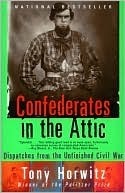More on this book
Community
Kindle Notes & Highlights
by
Tony Horwitz
Read between
June 19 - June 29, 2022
Roughly half of modern-day white Southerners descended from Confederates, and one in four Southern men of military age died in the War. For Yankee men, the death rate was about one in ten, and waves of post-War immigration left a far lower ratio of Northerners with blood ties to the conflict.
Charleston was the cradle not only of secession but also of Reform Judaism in America. Jews began arriving in Charleston in 1695; until the early nineteenth century, the city had the largest Jewish population in the country, with a quarter of all American Jews living in South Carolina.
A few weeks later, a Northern steamer called Star of the West left Brooklyn with supplies for the Sumter garrison. A Southern sympathizer in New York telegraphed Charleston. When the Star of the West tried to enter Charleston harbor at dawn on January 9, 1861, it was a Citadel cadet who sounded the alarm. He and three classmates then fired across the ship’s bow. Several other guns also opened fire. Three balls struck the ship’s side and the captain prudently steamed back to New York.
Davis’s last public speech, to a group of young Southerners shortly before his death: “The past is dead; let it bury its dead, its hopes and its aspirations; before you lies the future. Let me beseech you to lay aside all rancor, all bitter sectional feeling, and to take your places in the ranks of those who will bring about a consummation devoutly to be wished—a reunited country.”
Nor did Foote subscribe to romantic Southern views of the Lost Cause. Militarily, he believed, the Cause was always lost. Ideologically, the Cause was easy to mythologize precisely because it was lost.
Sam Watkins, a Confederate private who wrote a famous memoir about the War called Co. Aytch.
A staggering number of soldiers at Shiloh would never see the elephant again. One in four became casualties of the two-day battle, and the toll on both sides—24,000 in all—surpassed the combined American casualties in the Revolutionary War, the War of 1812, and the Mexican War.
Henry Stanley was but one among a cast of future celebrities at Shiloh. The Union generals included Grant (then still an up-and-comer shadowed by rumors of alcoholism), his deputy William Tecumseh Sherman (who had recently returned to the army after a nervous breakdown) and Lew Wallace, later to become author of Ben Hur. Also on hand were John Wesley Powell (who lost an arm here, but still navigated the Colorado River and Grand Canyon after the War), William Le Baron Jenney (a future Chicago architect and “father of the skyscraper”), and a young soldier named Ambrose Bierce, whose morbid short
...more
Grant’s in-laws were Missourians who owned slaves before the War; Grant acquired one from them and set him free a year later. As for Lee, the slaves in question were those his wife inherited in October 1857, with the stipulation that Lee, as executor, emancipate them within five years. Lee missed the deadline and didn’t free the slaves until December 29, 1863.
Chancellorsville, Spotsylvania, and the Wilderness ranked three, four, and six in the list of bloodiest Civil War battles; Fredericksburg rounded out the top ten. All told, the ten-mile-square territory we’d traversed that afternoon claimed 100,000 casualties.
The last land battle didn’t occur until a month later, at Palmito Ranch in Texas; it resulted, ironically, in a Southern victory.
The last Confederate general to capitulate was Stand Watie, a Cherokee who surrendered his Indian troops on June 23rd.
Meanwhile, a Confederate cruiser called the Shenandoah kept seizing Union whalers in the Bering Sea until late June and remained on the loose until docking at Liverpool on November 6...
This highlight has been truncated due to consecutive passage length restrictions.
“History is lived forward but it is written in retrospect,” the English historian C. V Wedgwood observed. “We know the end before we consider the beginning and we can never wholly recapture what it was to know the beginning only.”


